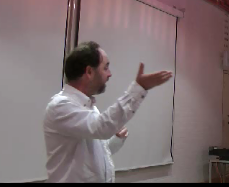#semphyssci
Cameron Neylon gave one of the first talks at Semantic Physical Science. No slides, just analysis and passion. Some of this has been published in his blog (http://cameronneylon.net/blog/ip-contributions-to-scientific-papers-by-publishers-an-open-letter-to-rep-maloney-and-issa/?utm_source=feedburner&utm_medium=feed&utm_campaign=Feed%3A+ScienceInTheOpen+%28Science+in+the+open%29 )

Cameron, like me, knows that Semantic science depends on people as well as technology and so he dwelt a lot on culture and practices rather than details. The talk was split into two parts. I have timelined this (roughly, there are no subtitles/breaks).
Here is the link to the video: http://vimeo.com/35398123 (Thanks Adrian Pohl)
The first section makes the case that good modern science must adopt quality control of the sort regularly practised in good software groups (common in industry, but not academia). Cameron is launching a new journal (Open Research Computing) to allow this approach to be published and thereby to give its practitioners formal value. Too much science has poor controls, poor aims, is not reusable and Cameron argues that we can learn these values from software engineering.
0:30 unit testing, criteria for judging science
1:30 continuous integration and test-driven design
2:00 good software practice helps to think about managing scientific process; better architectures for science in a broader term.
2:35 Creation of trained workforce, balance between training and research especially for graduates
3:30 good software is good mentality for good infrastructure for research
4:15 mustn’t create resources which aren’t used by anyone
4:30 computational experiments often don’t work
5:20 a unit test is just a control
5:50 publication and continuous integration
7:00 software can push quality into science
7:30 must be serious about replicating experiments
7:50 impact factor correlates with retractions
8:20 incentive not properly structured
9:00 new journal Open Research Computing
10:00 software methods papers
10:50 if 5% of papers are software get high impact
The second half critiques the Research Works Act. Cameron has shown that publishers add NO VALUE to his last 10 papers. As his blog (above) says:
Results: The contribution of IP by publishers to the final submitted versions of these ten papers, after peer review had been completed, was zero. Zip. Nada. Zilch. Not one single word, line, or graphical element was contributed by the publisher or the editor acting as their agent. A small number of single words, or forms of expression, were found that were contributed by external peer reviewers. However as these peer reviewers do not sign over copyright to the publisher and are not paid this contribution cannot be considered work for hire and any copyright resides with the original reviewers.
11:25 Research Works Act would wipe out NIH mandate and set us back years
12:00 Agument is that publishers contribute to quality of science
12:30 what do publishers contribute to Cameron?
12:50 ZERO (Zip Nada Zilch)
13:30 Publishers do provide a service
13:50 publishing not zero-cost
14:10 Old paper model is obsolete; all costs in generating first copy
14:50 publishing model is really bad way to run business
15:10 must address service costs
15:40 Transitional period required; RWA turns clock back
16:15 how to build service market
16:45 Must turn publishing round and address service
17:10 Software is a service. How do we configure the market?
18:30 Software gives us experience and clues
Here is the link to the video: http://vimeo.com/35398123
Thanks,
I put it in but Vimeo decided I was a spammer and removed it